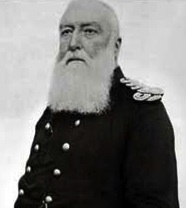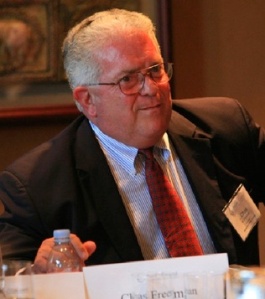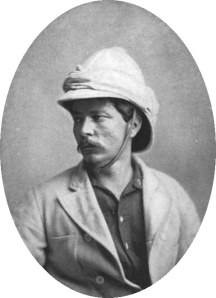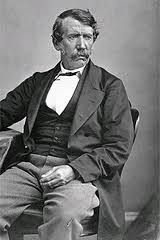In the late 19th century, Henry Morton Stanley (of Stanley and Livingston fame), (right) was the “king’s man”—more accurately, a hired colonist conqueror—working for Belgium’s King Leopold II.
Stanley’s assignment: Seize and conquer for Belgium, the vast and unexplored territory surrounding Africa’s Congo River, a territory that stretched from Stanley Falls in the north to the mouth of the river, where it empties into the Atlantic Ocean.
Stanley and King Leopold worked with the conqueror’s template, one which the 19th and 20th century Zionist movement also utilized to create a Jewish homeland in Palestine.
The formula used by Leopold and the Zionists is a well-worn conquerors’ formula of deceit, deception, destruction and seizure.
In his book, King Leopold’s Ghost: A Story of Greed, Terror, and Heroism in Colonial Africa, Adam Hochschild tells the sordid and sad, but still illuminating, story of Stanley’s successful conquest of Central Africa in the 19th century.
One description of the book offers a dark portrait of King Leopold:
Carrying out a genocidal plundering of the Congo, he looted its rubber, brutalized its people, and ultimately slashed its population by ten million–all the while shrewdly cultivating his reputation as a great humanitarian.
Hochschild’s book focuses on King Leopold, but the modern reader should see the historical parallel of Belgium’s African empire with the Zionist movement’s (still on-going) seizure of Palestinian land.
During his reign on Belgium’s throne, King Leopold never visited what was then commonly referred to as the “dark continent”. But as king of a tiny nation, he desperately wanted an empire of his own to rival those of his neighbors, England and France.
Hollywood’s version of the meeting between Stanley and Dr. David Livingston was a highly romanticized portrait of journalist and explorer Henry Morton Stanley. Livingston’s actual role in this drama is described by Hochschild:
“All those European impulses toward Africa—antislavery zeal, the search for raw materials, Christian evangelism, and sheer curiosity—were embodied in one man, David Livingston (left).
Physician, prospector, missionary, explorer and at one point even a British consul, he wandered across Africa for three decades, starting in the early 1840s. He searched for the source of the Nile, denounced slavery, found Victoria Falls, looked for minerals and preached the gospel. As the first white man to cross from coast to coast he became a national hero in England.”
While on another long expedition inside Africa, Livingston disappeared. Sensing a major story, New York Herald publisher James Gordon Bennett hired Henry Stanley to “find Livingston”. He succeeded, though actual details of his meeting with Livingston are unclear. Stanley was a self-promoter who shaped the narrative of his exploits and the meeting of the two men. .
Stanley’s reputation soared. Now an expert on Africa, as well as master of deceit and deception, Stanley was courted, and then hired, by King Leopold, to prepare the way for a Belgian colonial kingdom in Africa. Greed and personal aggrandizement hidden behind the elevated rhetoric of Christian zeal, were combined in a story which the media of the day embraced daily.
Again, Stanley controlled the narrative, appropriately enough for a man serving a king determined to build a colonial empire while keeping his enemies oblivious to his intentions. Stanley and Leopold were true soul mates.
The 19th century colonization of the Congo basin did, indeed, lead to the establishment of a series of Belgian colonies, “countries” on a map drawn by King Leopold. The area of the Congo basin, if placed on the map of the United States, would cover the area east of the Mississippi River.
Across that large expanse, two power-hungry men—a king and his conniving journalist-explorer partner—established the groundwork for “a confederation of free negro republics” along the Congo River.
The use of the term “free”, of course, as Hochschild writes, was “merely a prop to be removed as soon as the curtain closed”. The deceit and deception were easily employed during a period when racism and ignorance shaped the public’s understanding of the mysterious continent of Africa.
As one of Leopold’s subordinates wrote Stanley:
There is no question of granting the slightest political power to negroes. That would be absurd, the white men, heads of the stations, retain all the powers.
In a final message to Stanley, King Leopold (right) confirmed the true narrative behind Stanley’s journey. He wrote: 
I take advantage of a safe opportunity to send you a few lines in my bad english . . It is indispensable you should purchase . . . as much as you will be able to obtain, and that you should place successively under . . suzerainty…as soon as possible and without losing one minute all the chiefs from the mouth of the Congo to the Stanley Falls . . . .If you let me know you are going to execute these instructions without delay I will send you more people and more material. Perhaps Chinese coolies.
Deception is an essential ingredient in the steady march of conquerors. As he wrote his “suzerainty” note to Stanley, Leopold “piously” assured the British minister in Brussels that his venture in Africa “had no commercial character; it did not carry on trade.”
It is worth noting that “suzerainty”* (see definition below) is a term describing the absolute control of a larger state over a smaller one. The term originated during the Ottoman empire era.
Which raises the question: Does Israel aspire to become a modern Ottoman empire?
In an ominous Leopold precursor to the current success of the Zionist invasion of Palestine, the King concluded his message to Stanley:
I also recommend you to establish barriers and tolls on the parts of the road you have opened. It is but fair and in accordance with the customs of every country.
The evil that men do lives after them in the actions of those who follow knowingly, or unknowingly, a formula of conquest that has worked in other centuries and in other lands.
 Which brings me to the ongoing work of a modern prophet, Chas Freeman, whose books and lectures provide a rare voice against Zionism’s unrestrained conquest of Palestine.
Which brings me to the ongoing work of a modern prophet, Chas Freeman, whose books and lectures provide a rare voice against Zionism’s unrestrained conquest of Palestine.
Freeman was an early Obama administration appointee whose forced withdrawal from a post for which he was clearly highly qualified, was an early indication that President Obama would be overly sensitive to Zionists in his administration when he made appointments and considered plans deemed unacceptable to Israel and its American AiPAC-led agents.
I wrote about that early period of disappointment with Obama and the Zionist influence in his administration, for Link, a publication of Americans for Middle East Understanding (AMEU). A pdf of that essay is available here.
Freeman survived his 2009 encounter with the Israel Lobby. Today, he continues to provide wise guidance on all matters related to Israel’s conquest of Palestine.
A most recent example may be found in an address he gave at a January 16, 2013, Washington conference convened by the Middle East Policy Council, entitled, “U.S. Grand Strategy in the Middle East: Is There One?”
Freeman was the opening speaker at the conference, the full text of which may be found here.
The opening of Freeman’s presentation put the US Middle East strategy in a moral context:
Over the past half century or so, the United States has pursued two main but disconnected objectives in West Asia and North Africa: on the one hand, strategic and economic advantage in the Arabian Peninsula, Persian Gulf, and Egypt; on the other, support for the consolidation of the Jewish settler state in Palestine. These two objectives have consistently taken precedence over the frequently professed American preference for democracy.
These objectives are politically contradictory. They also draw their rationales from distinct moral universes. U.S. relations with the Arab countries and Iran have been grounded almost entirely in unsentimental calculations of interest. The American relationship with Israel, by contrast, has rested almost entirely on religious and emotional bonds. This disconnect has precluded any grand strategy.
It is significant that Freeman does not refer to Israel’s “occupation”, but instead, stresses that what the US is supporting is “the Jewish settler state in Palestine”.
Occupation is the term Israel and the world media employs as Israel steadily and deceptively seized more and more Palestinian land, not unlike King Leopold’s deceptive strategy to set up a “confederation of free republics” along the Congo River.
Occupation is a euphemism, one of many employed in Israel’s hasbara (reeducation) campaign to rewrite the reality of a conquered people. Occupation is a word used to cover the truth of Israel’s long-range plans to seize all of the land between the Mediterranean Sea and the Jordan River.
Occupation is a term normally used to describe a temporary holding arrangement, as, for example, the US occupation of Germany following World War II. This so-called “occupation” has continued since Israel, under the United Nations first established its modern state in 1948. It is no occupation; it is, as Freeman writes, the creation of a “settler state in Palestine”.
Israel has pretended, with the help of its AIPAC-led allies in the Congress and White House, that it really wanted to participate in a “peace process”, a carefully orchestrated lie maintained by Western mainstream and alternate media alike.
It has been a lie successfully maintained with the support of the American public’s desire for a reality easily grasped in black and white terms, e,g, “savage” American Indians facing the Puritans; “inferior” black Africans trading land for a pittance to King Leopold; and more recently, the long-running Cold War between communists and the “free world”.
Israel has effectively manipulated public opinion to make Islam the new communism, a new enemy to engender fear of constant imminent danger.
Eager to engender more fear, our politicians and media have together elevated the alleged Boston Marathon bombers into Islamic-driven zealots, following every lead that might link the Boston bombers to a dark, foreign, Islamic organization.
The Zionist campaign to see any and all designated “enemies” of Israel as the action of “terrorists”, is the ongoing effort to retrieve The Clash of Civilizations, a theory “that people’s cultural and religious identities will be the primary source of conflict in the post-Cold War world.”
The Clash concept was proposed by political scientist Samuel P. Huntington in a 1992 lecture at the American Enterprise Institute, which he then developed in a 1993 Foreign Affairs article titled “The Clash of Civilizations?“, in response to Francis Fukuyama’s 1992 book, The End of History and the Last Man. (Wikipedia).
Ours is a public that prefers not see the evil that is inherent in conquering other nations, preferring, instead, to grasp any excuse to divide the world between Us and Others, with Us as the good guys and Others as the bad guys.
Chas Freeman offers historic parallels for conquerors and their goals:
The increasingly blatant racism and Islamophobia of Israeli politics, the Kafkaesque tyranny of Israel’s checkpoint army in the Occupied Territories, and Israel’s cruel and unusual collective punishment of Gaza have bred hateful resentment of the Jewish state in its region and throughout the Muslim world. One has to look to North Korea to find another polity so detested and distrusted by its neighbors and with so few supporters among the world’s great powers.
Just as the book and movie, The Exodus, were peddled for decades as the “true story” of Israel’s creation as a state, the movie version of Stanley and Livingston created the narrative that Stanley (as portrayed by Spencer Tracy) was a dedicated journalist looking for a “man of God” who went to Africa to do good.
In this clip, we see and hear the famous quote, “Dr. Livingston, I presume.”
With Hollywood’s support and the power of political Zionist in American culture, the “blatant racism and Islamophobia of Israeli politics” has successfully made its insidious way into the American psyche.
Until we realize this, we will continue to function as a nation without the moral compass that should lead us. Absent that moral compass, we will continue to yield to the Zionist racist-driven conquerors’ worldview of the Clash of Civilizations.
* From Wikipedia:
Suzerainty (pron.: /ˈsjuːzərənti/ or /ˈsjuːzərɛnti/) occurs where a region or people is a tributary to a more powerful entity which controls its foreign affairs while allowing the tributary vassal statesome limited domestic autonomy. The dominant entity in the suzerainty relationship, or the more powerful entity itself, is called a suzerain. The term suzerainty was originally used to describe the relationship between the Ottoman Empire and its surrounding regions. It differs from sovereignty in that the tributary enjoys some (often limited) self-rule. (emphasis added.)



Jim, thank you for this brilliant associative discourse. I clicked to your lengthy 2009 Link essay for IMEU on the Lobby’s destroying Chas Freeman’s chance to lead the N.I.S. and was angered anew at the fervid, evil machinations of Schumer et al. Observant Christians and other morally minded Americans simply must force an end to this sordid chapter of political/militant Zionism and its determination to erase the Palestinians from their (holy) land.